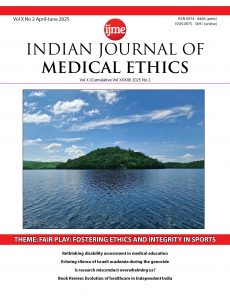
The values of fairness, excellence, and respect are supposed to be nurtured through participation in Sports. But with sport becoming a highly competitive billion-dollar industry, corruption, banned drugs, exploitation by gatekeepers and other new challenges have become prevalent. The theme section in this issue focuses on documented cases of abuse of political and financial clout to interfere in a sporting organisation’s domestic politics, to sexually abuse female athletes, and to discriminate between athletes based on gender, class, caste, region, and religion. On the positive side, two authors discuss how to create an inclusive sports culture.
As the use of AI increases, so do concerns about its potential misuse. An editorial in this issue analyses the UNESCO draft recommendations on the ethics of neurotechnology and evaluates the need for India-specific safeguards, particularly in light of its growing integration with AI, while a commentary examines the ethical implications of the use of algorithmic radiology.
A case study showcases an inclusive working model focusing on a person’s productive abilities rather than their disabilities in a Supreme Court judgment, while a research article tries to fill the gap created by the absence of ethical framework for clinical care for children with cancer in India.
A reflection piece highlights Israeli academia’s failure to uphold its ethical responsibilities amidst genocide by the state, and failure to support the few voices of dissent.
We celebrate the contributions of two distinguished figures to bioethics and medical humanities, awardees of the 2025 FMES-IJME Ethics Awards.
__________________________________________________________________________________________________________Cover credit: Serenity, courtesy Shirom Selvaraj
